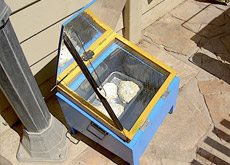By: Karin Wall
Existing technologies, such as telecommunications, are often designed for the developed world. But an innovative focus is also urgently needed to address issues in developing countries. This is something that the Royal Institute of Technology, KTH, has acted upon and is sending students to Africa with the purpose to identify needs and develop innovative solutions. Read more in this interview with Professor Margareta Norell Bergendahl.
For example, there is a great need to make energy accessible for people living in the third world. This offers the challenge not only for innovative solutions to their immediate problems, but also to enable income opportunities, so that the products bring with them sustainability and independence. There is an untapped opportunity for design from scratch products, services and businesses aimed at low-income markets.
The challenge is to recognize these communities not only as consumers but also as co-producers.
The challenge is to recognize these communities not only as consumers but also as co-producers. This mind shift in recognizing the millions of people living in poverty as actors, consumers and producers will open up mutual benefits – both from a poverty reduction perspective, and from an energizing commercial perspective.
This is something that Professor Margareta Norell Bergendahl (from the School of Industrial Engineering and Management at KTH, the Royal Institute of Technology) has been thinking a lot about.
Sending students on field trips
For several years now the Swedish university has been sending students on field trips to rural Namibia and to other African countries. Their mission is to try to understand the reality in these countries and to identify and define the particular needs for new products and services. The next step is to develop a new product or service that meets those needs and to transfer the concept to local entrepreneurs to create local businesses.
– As well as being an interesting pedagogical study, this is a very challenging project for our Masters students. And it is also a way of being part of something that really makes a difference and perhaps also offers them another perspective on their own lives. It’s a real challenge to comprehend, and a compassionate and innovative outlook is required to be able to define the needs that exist and to spot the enormous business possibilities that can be initiated here, says Margareta Norell Bergendahl.
– And very real part of the task is to grasp what the physical and social reality is in these countries. I think that if you can get local entrepreneurs on board, encourage and facilitate their interest to build businesses from these new innovations, that’s a very big step forward.
PIEp, the Product Innovation Engineering programme with nodes across the whole of Sweden, is beside Sida, Swedish International Development cooperation Agency, an important supporter of the KTH masters students who sign up for the field trips and the subsequent life-changing challenges. With the support of teachers and researchers in the PIEp network, who share their time and experience, the students are able to develop their innovations from concept through design to reality, Plus, with PIEp’s unique multidisciplinary set up, students have the potential to make contact with a wide range of people from industry and Swedish councils, a valuable avenue for young entrepreneurs.
Off grid solutions and solar powered baking oven
 The Sunbaker, a solar powered oven, is a recent result of one of these field trips. The prototype has been developed by a group of KTH/PIEp Masters students. Some pictures of the oven can be found in his blog “The Solar oven in Namibia”, written (in Swedish) by the students.
The Sunbaker, a solar powered oven, is a recent result of one of these field trips. The prototype has been developed by a group of KTH/PIEp Masters students. Some pictures of the oven can be found in his blog “The Solar oven in Namibia”, written (in Swedish) by the students.
Other students have been researching off-grid solutions to bring power to remote areas. The projects always start with field studies to understand and identify the needs.
– We try to work very hands-on and create solutions that will lead to local business opportunities for the local people. So it’s not a question of distributing aid, it’s a question of trying to enable people to help themselves.
This year the students will work with developing new business models.
– We notice that there is a growing interest for this program among our students and the faculty is also very much into it. I think it contributes by bringing a wider understanding of the concept of “need” to the students, through which they may even begin to reevaluate our so-called “needs” in the western world. I see enormous potential for what we are doing and I am very excited about what we can achieve in both worlds.
By Karin Wall, Chief Editor
